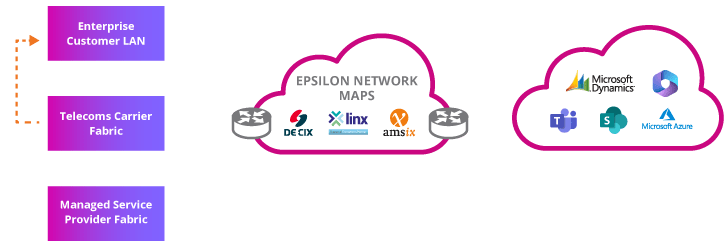Optimise your access to Microsoft 365, Azure, and other cloud services with Microsoft Azure Peering Service (MAPS).
MICROSOFT AZURE PEERING SERVICE
Experience Low Latency Connectivity with Microsoft Azure Peering
BENEFITS
Accelerating Cloud Transformation with Greater Security and Performance
Epsilon’s MAPS provides enterprises with a highly reliable and optimised private connectivity to any public Microsoft cloud service. With direct routing to Epsilon’s partner ecosystem of Internet Exchanges, enjoy scalable connections with reliable uptime and advanced security.
YOUR TRUSTED PROVIDER
How Microsoft Azure Peering Service (MAPS) Works
Epsilon’s MAPS provides direct connectivity to any public Microsoft cloud service via leading peering infrastructures on our resilient global network fabric to Microsoft’s public network backbone.
With optimised routing where traffic enters and leaves through the nearest Microsoft Edge Point of Presence (PoP) on the Microsoft Global Network, you will be assured of faster connectivity and better application performance.

USE CASES
Building Up Your Business Resilience
Epsilon’s MAPS ensures that your Microsoft business applications are always up and running, with superior technical and operational support for maximum uptime.
Get a glimpse of how our solutions can support your core business functions more effectively and efficiently through uninterrupted, secure connectivity to Microsoft services for enhanced user experiences and employee productivity.

Securing business data
Currently connecting to Microsoft’s cloud services via the public internet?
Protect against the cyber vulnerabilities and poor network performance of the public internet by connecting directly to any public Microsoft cloud service via Epsilon’s MAPS. With reduced Round-trip Time (RTT) from users’ sites to the Microsoft Global Network, we ensure that you will get high-performance connectivity.
Optimising business application performance
Struggling with inconsistent, unreliable connectivity?
Gain low latency, uninterrupted connectivity to your Microsoft services via Epsilon’s global network fabric that enables you to peer with leading Internet Exchanges for greater sustainability and robustness of your business operations.
Low latency network for bandwidth-critical applications
Seeking an optimised solution for bandwidth-critical Microsoft applications?
Optimise your traffic with Epsilon’s MAPS to ensure that users are routed to the shortest internet path to and from Microsoft for improved application delivery and performance of mission-critical applications.
MICROSOFT AZURE PEERING SERVICE
Ready to secure your connection to Microsoft services?
Talk to an ExpertFrequently Asked Questions
1. What is Microsoft Azure Peering Service?
Microsoft Azure Peering Service (MAPS) is a partnership program with key service providers to provide best-in-class public internet connectivity to their enterprise users by offering direct, highly available, geo-redundant connections and optimised routing to Microsoft services.
2. How does Epsilon’s Microsoft Azure Peering Service work?
Epsilon’s Microsoft Azure Peering Service (MAPS) improves user experiences for businesses connecting to Microsoft SaaS by reducing the round-trip time (RTT) from a user’s site to the Microsoft Global Network. It does that by providing direct connectivity to any public Microsoft cloud service via leading peering infrastructures on our resilient global network fabric.
3. What services can I access using Microsoft Azure Peering Service?
Epsilon’s Microsoft Azure Peering Service (MAPS) provides you with access to any public Microsoft cloud service, including Microsoft Azure, Microsoft 365, Microsoft Dynamics 365, and any other Microsoft service.
4. What’s the difference between Microsoft Azure Peering Service and Microsoft Azure ExpressRoute?
Microsoft Azure Peering Service offers public connectivity with optimised routing for reliable connectivity to Microsoft services.
On the other hand, Microsoft Azure ExpressRoute is a private, dedicated connection that links enterprises to Microsoft’s data centres. Types of private connections include IP VPN or point-to-point Ethernet networks.






